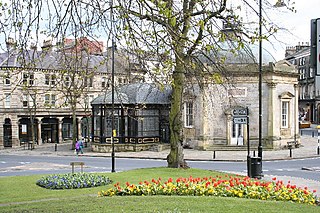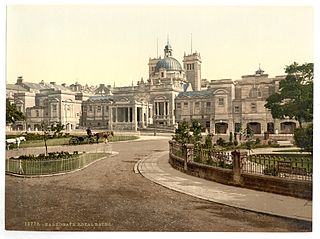
Tewit Well, also known in its early days as "Tuit" or "Tuewhit", is a spa water well, the first chalybeate source discovered in Harrogate, North Yorkshire, England. [1]

Tewit Well, also known in its early days as "Tuit" or "Tuewhit", is a spa water well, the first chalybeate source discovered in Harrogate, North Yorkshire, England. [1]
After marrying Elizabeth Broad, William Slingsby (uncle of Sir William Slingsby) [1] took his new wife on a Grand Tour of Europe. In 1571, [2] Slingsby discovered that water from a well in Knaresborough Forest, now called The Stray, public parkland in Harrogate, possessed similar properties to that at Spa in Belgium. He named the well "Tewit", after a local word for peewit or lapwing, a bird which still frequently flocks on the Stray.
Tewit Well had fewer visitors than the wells in Low Harrogate, or even St John's Well in High Harrogate, because of its distance from Victorian hotels and lodging houses. In 1842, the structure designed by Thomas Chippendale in 1807 [3] enclosing the Royal Pump Room, which sits over the Old Sulphur Well, was replaced by a new structure designed by Isaac Shutt for the Improvement Commissioners. The old structure was then moved to Tewit Well. [4]
The structure still stands on the edge of the Stray, known as Cherry Tree Walk as all the paths are lined on both sides with cherry trees. It is a Grade II* listed building. [4] It carries Harrogate's first Brown Plaque, which was designed in part by Harrogate historian Malcolm Neesam in 1971. [5]
A local youth brass band, The Tewit Youth Band, is named after this landmark.

Harrogate is a spa town in the district and county of North Yorkshire, England. Historically in the West Riding of Yorkshire, the town is a tourist destination and its visitor attractions include its spa waters and RHS Harlow Carr gardens. 13 miles (21 km) away from the town centre is the Yorkshire Dales National Park and the Nidderdale AONB.

Grove House is a former inn, school, house and orphanage on Skipton Road, Harrogate in North Yorkshire. Built in 1745–54 as World's End Inn, it was later greatly expanded as the home of the prominent inventor Samson Fox. It was the first house in Yorkshire to have lighting by water gas. It is Grade II* listed on the National Heritage List for England.

The Royal Pump Room is a Grade II* listed building in Harrogate, North Yorkshire, England. Today it houses the town's museum – operated by North Yorkshire Council. It was formerly a spa water pump house. It is located in Crown Place in the western part of Harrogate town centre, opposite the town's Valley Gardens park. It is bounded by two streets, Crescent Road and Royal Parade. Today, the Pump Room consists of both the original 1842 stone rotunda and a glazed annexe which was opened in 1913. The Pump Room offered guests of the town an all weather facility where they could drink sulphur water which was pumped on site from a natural spring known as the Old Sulphur Well. The building also had a social element to it as it provided guests with a place to meet friends and get to know others.

Sir William Slingsby was an English soldier who is often erroneously noted as the discoverer of the first spa water well in Harrogate, North Yorkshire.
Edmund Deane (1572–c.1640) was an English physician and author. He is known for a significant work on the chemistry of mineral springs, and as an editor of alchemical tracts.

The White Hart is a hotel, conference centre and grade II* listed building located in the Montpelier Quarter of Harrogate, North Yorkshire. It has served visitors to the spa town for over 250 years.
Harrogate International Festivals (HIF) is a registered charity and one of the UK's longest running arts festivals, having been established in 1966. It is based in Harrogate, North Yorkshire.

The Stray is a long area of public parkland in the centre of Harrogate, North Yorkshire, England, comprising 200 acres (81 ha) of contiguous open land linking the spa town's curative springs and wells. The contiguous area of land, not all of which is officially designated part of The Stray, forms an approximately U-shaped belt from the Cenotaph on the north west point of the U, down the A61 road, along a broader southern belt of fields, enclosing the building of Church Square, and up to the north east tip of the U at The Granby. The Stray includes the site of Tewit Well, marked by a dome.

Bilton Hall is a Grade II listed large country house near Harrogate, North Yorkshire. It was historically the home of the prominent Stockdale family, of which three Knaresborough MPs were members.

The Ripon Spa Baths are a grade II listed building in Ripon, North Yorkshire, England. It was built between 1904–05 as a spa but failed to compete with the larger facilities at nearby Harrogate. In 1936 a new pool was constructed to the rear and the facility converted to a swimming baths. The building is noted for its ornate terracotta-clad frontage and received listed building protection in 1980. Harrogate Borough Council proposed selling the building for housing development in 2008 on the grounds that it required significant structural repair. The sale was cancelled but in 2021 the council made a new proposal to sell the structure.

Valley Gardens is a grade II listed park in Harrogate, North Yorkshire, England. The park, which covers 17 acres (6.9 ha), was laid out in 1887 to commemorate the golden jubilee of Queen Victoria.

The Harrogate Club is a private members' club, open to men and women, based in Harrogate, North Yorkshire, England. Founded in 1857, it is located on Victoria Avenue, Harrogate.

Malcolm George Neesam was an English historian and writer specialising in the history of Harrogate, North Yorkshire. He was also a librarian and archivist. His major works were the first two parts of a projected trilogy on that subject: Harrogate Great Chronicle, 1332–1841 (2005) and Wells and Swells: The Golden Age of Harrogate Spa, 1842–1923 (2022). The third part was to remain unfinished when he died, although his research papers are preserved in the Walker-Neesam Archive at the Mercer Art Gallery, Harrogate.

Richard Ellis was an English builder, property developer, alderman, mayor, and a public benefactor to his town. The son of a blacksmith, he was a self-made man who started as a joiner and became a rich developer who joined High and Low Harrogate into a single town, helped obtain a Charter of Corporation, and promoted the erection of civic buildings appropriate for a spa town. Thus he became known as the Bismarck of Harrogate, his achievement in joining two villages to create a single town having been wittily compared in the 19th century with Bismarck's unification of Germany.

Royal Baths, Harrogate is a Grade II listed building in Harrogate, England, which housed a hydrotherapy centre established by the Corporation of Harrogate in 1897 as part of its vision to make Harrogate the Nation's Spa Town. The Royal Baths continued in full operation through to 1969, winding down fairly rapidly after losing a National Health Service contract in that year. In contemporary times its Victorian Turkish baths continue to be operated, the rest of the building being used as a restaurant and tourism information centre.
John Henry Hirst was an English architect who designed civic, commercial and domestic buildings, mainly in Bristol and Harrogate. He is known in Harrogate for the designs which he created for the developer George Dawson, including large Neoclassical buildings, and the Gothic Revival St Peter's Church. Several of those designs, such as Prospect Crescent, Cambridge Crescent, and St Peter's Church, are now listed buildings. He is known in his home town, Bristol, for various projects, notably the Neoclassical Stoke Road Drinking Fountain, which is also a listed building.

The Mercer Art Gallery, formerly the Mercer Gallery and locally known as The Mercer, is an art gallery in Harrogate, North Yorkshire, England. It was established in Lower Harrogate's Old Town Hall building in 1991. Owned by North Yorkshire Council, it has a collection of over 2,000 items, mainly 19th- to 21st-century artworks, including pieces by local artists. It hosts a rolling series of exhibitions of its own and borrowed artworks, keeping most of its own collection in storage for much of the time, or loaned out to exhibitions at other galleries, and to local establishments.
The Paris Pavilion is a historic building in Harrogate, a town in North Yorkshire, in England.

The Crown Hotel is a historic building in Harrogate, a town in North Yorkshire, in England.

St John's Well is a spa water well in Harrogate, a town in North Yorkshire, in England.
![]() Media related to Tewit Well at Wikimedia Commons
Media related to Tewit Well at Wikimedia Commons